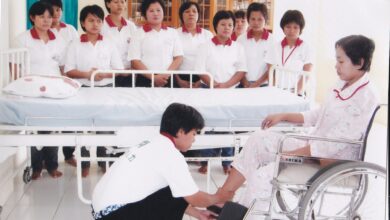German Media Reveals the Lesbi Phenomenon of Migrant Workers in Hong Kong

DDHK News, Hong Kong - Lesbianism or same-sex relations (women) received the attention of the German media, Deutsche Welle. On the site, dw.de, this German online media with an Indonesian title ran the title "Migrant Workers and Same-Sex Relations in Hong Kong".
It said 40 percent of domestic helpers in Hong Kong are involved in same-sex (lesbi / homosexual) relationships. Why and what obstacles did they encounter?
Marrz Balaoro, a 56-year-old woman recalls what happened decades ago. When he was 12 years old, at the request of his parents, he received a prescription hormone injection from a doctor. Her parents hope that with that, she can look more feminine.
"The doctor asked me what I would feel when I saw a handsome man," said Balaoro, who was born in Abra province in northern Luzon. "Without thinking much I said, I envy him and I want to look like him. The doctor thought, my case is hopeless, "said Balaoro.
For Balaoro, to admit to being a lesbian in the 1980s, it was much easier to do in Hong Kong than in the Philippines. "My first employer was attentive and he understood my situation," he said. "I came to Hong Kong because I wanted to be who I am. alone. I want to be free, "continued Balaoro. He admits that his struggle to be understood in his country began when he was young and continued until his difficult teenage years.
After witnessing a lesbian from the Philippinesbully by Filipinos in Hong Kong, he then formed the Filguys Association, an association whose mission is to help Filipino homosexual migrants who experience discrimination.
Filguys membership has reached 400 people and the association regularly holds seminars throughout the city.
More free in Hong Kong
While a conservative culture still dominates Hong Kong society, for many migrant workers, Hong Kong is a place where one can more easily live as a gay person, especially for Indonesian Muslims and devout Filipino Catholics.
Working long hours, away from home for little pay and little time off - quite difficult life for migrants in Hong Kong.
However, for some migrants, Hong Kong is a city that can give recognition to freedom of sexual orientation not found in the countries of origin of these workers.
"In Hong Kong we are free. We can show our sexual identity, ”said Jenny Patoc, who was born biologically as a woman and is now 41 years old. He works as a housemaid and met his girlfriend, a woman, in Hong Kong 15 years ago. They later married, although in Hong Kong same-sex marriage is still not legally recognized.
Need your own space
“If you want to evoke your own sexuality, you need a private place. However, the biggest problem for overseas migrant workers in Hong Kong is that their personal space is very limited, ”said Yau Ching, Lingnan University social scientist.
According to the law, domestic workers in Hong Kong are required to live with their employers, which means that they sometimes have to live in cramped and almost uninhabitable spaces.
Patoc was lucky enough to be able to rent a small apartment to use every Sunday with his partner. He also rents out part of his apartment to other people who are also seeking privacy. “Every holiday we stay together and do the same thing. We love each other, ”said Patoc.
“Isolation, loneliness all come together in migration. What they need is emotional comfort followed by physical comfort. You want to find someone equal and safe, ”said Amy Sim, an anthropologist at the University of Hong Kong.
He cited a report that said that 40 percent of migrant workers in Hong Kong have had same-sex relationships. The causes are loneliness, curiosity and increased freedom to experiment.
Roughly 300.000 domestic workers who work as domestic servants can earn around 6.000.000 Rupiah per month in Hong Kong. Most of the domestic workers come from the Philippines, Indonesia and Thailand where many of them send their salaries to their families to help the family economy. (dw.de). *



